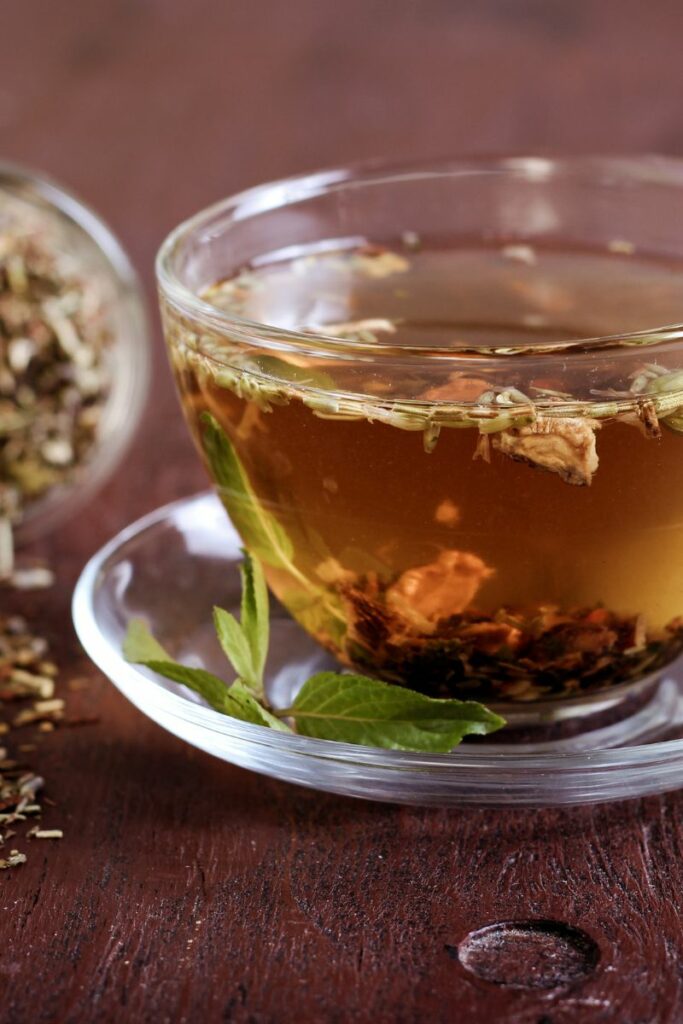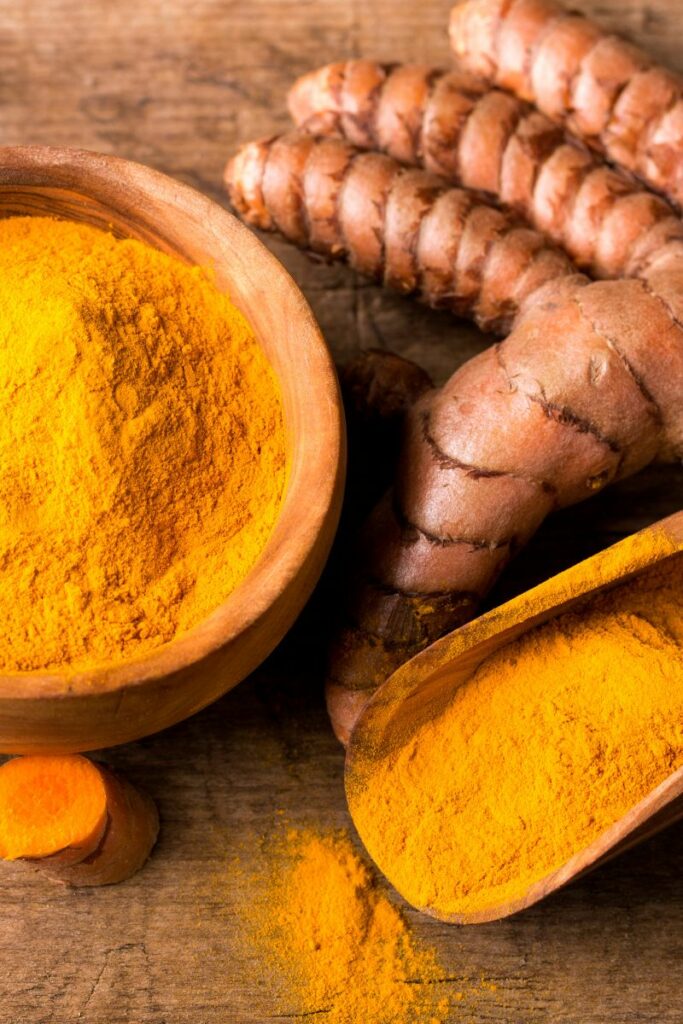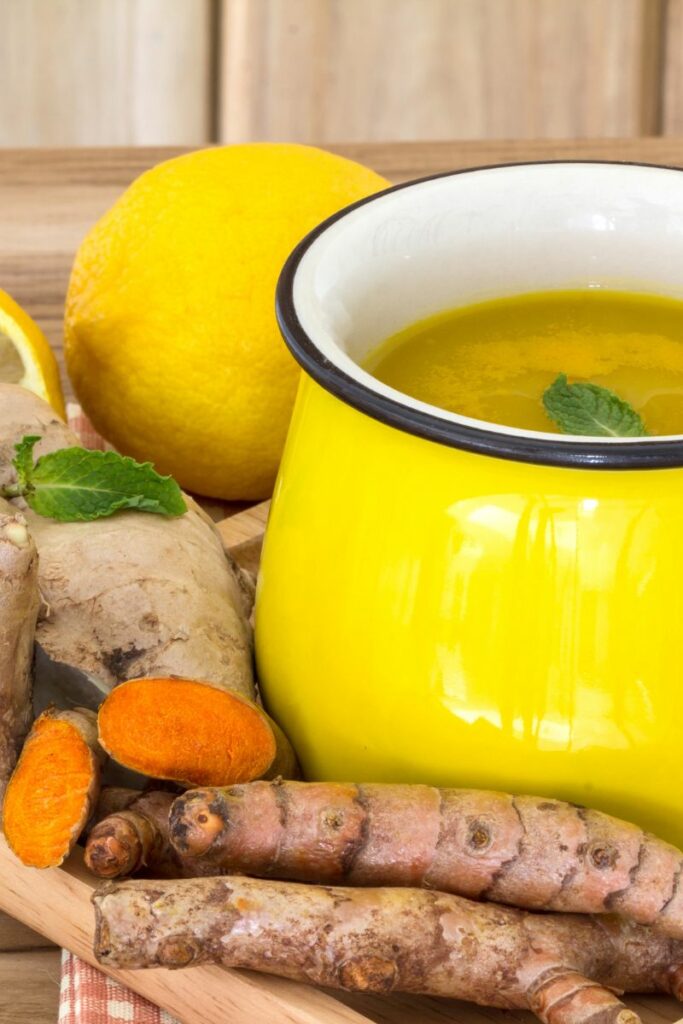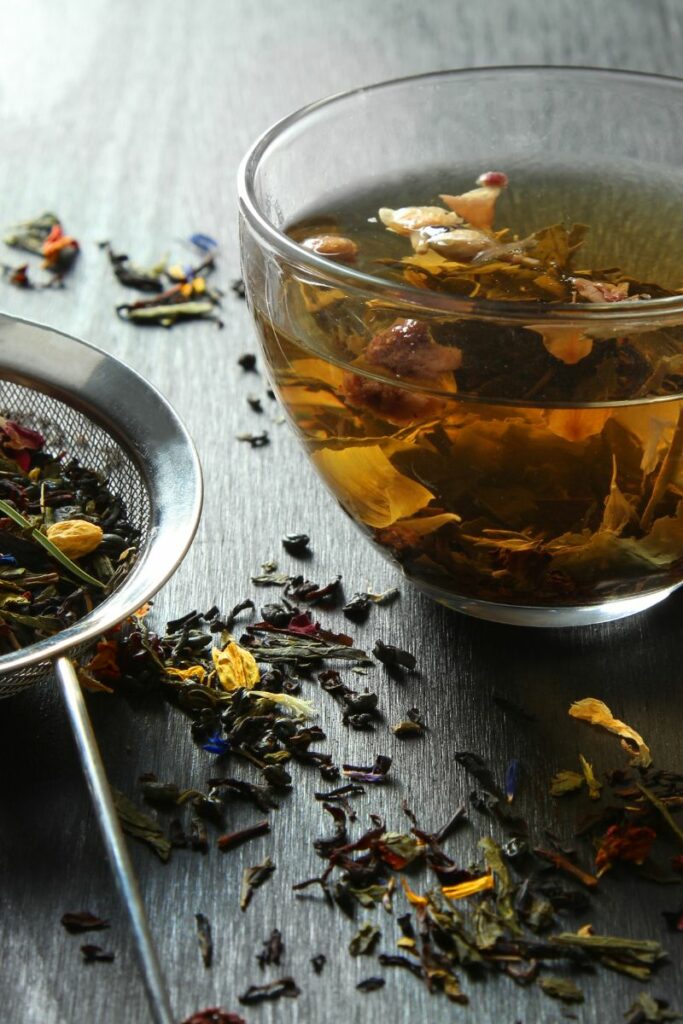Best Herbal Tea For Back Pain (Relieve Inflammation)
Herbal tea for back pain is something almost everyone should consider, as back pain is a common issue that can disrupt daily life. This article will go over how we can relieve inflammation and ease aches and pains using natural herbs.

Disclaimer: This is not medical advice. Information and statements shown here are for educational and informational purposes only and are not to replace the advice of your healthcare professional.
This post may include affiliate links. Please refer to our disclaimer for full disclosure.
Back pain is something almost everyone experiences at some point in their life. It can make simple tasks like sitting, standing, or even sleeping uncomfortable and disrupt your daily life.
While conventional pain relief methods, such as non-steroidal anti-inflammatory drugs (NSAIDs), can be effective, they often come with unwanted side effects like stomach issues or drug interactions. Plus, they don’t always address the root cause of the pain.
That’s where herbal teas come in. Herbal teas are a natural and effective way to relieve back pain and reduce inflammation. Packed with powerful anti-inflammatory properties and natural pain relievers, these teas can help soothe sore muscles, improve blood flow, and support your overall health.
By adding herbal teas to your daily routine, you can manage back pain more gently and naturally, enhancing your quality of life without relying solely on traditional medicine.
Understanding Back Pain and Inflammation
What Causes Back Pain?
Back pain can happen for many reasons. Common causes include muscle strain, arthritis, and inflammation. Muscle strain often occurs when you lift something heavy or move in a way that pulls or stretches your back muscles too much.
Arthritis, especially rheumatoid arthritis, can also cause back pain by inflaming the joints. Inflammation is a key player in many types of back pain. When your body is inflamed, it sends signals that can cause pain, swelling, and discomfort, making it hard to move or even rest comfortably.

The Role of Herbal Teas in Pain Relief
Herbal teas can play a big role in relieving back pain. Certain herbs have anti-inflammatory and analgesic (pain-relieving) properties that help reduce pain and soothe inflammation naturally.
By drinking herbal tea for back pain, you can use the power of natural remedies to ease your discomfort. These teas are a gentle way to manage symptoms without the side effects often seen with conventional pain medications. Plus, they can be a great addition to your daily routine, helping to improve your quality of life and support your overall health.
Best Herbal Tea for Back Pain Relief
1. Turmeric Tea
Benefits: Turmeric tea is known for its powerful anti-inflammatory properties, thanks to the active ingredient curcumin. It helps reduce pain and stiffness in the back and joints.
How It Works: Curcumin blocks inflammatory cytokines and enzymes in the body, which are responsible for causing pain and swelling.
Taste Profile: Turmeric tea has an earthy, slightly bitter taste with a hint of spice. It can be an acquired taste but is very warming and soothing.
Pairs Well With: Honey and lemon are great additions to balance the bitterness and add a touch of sweetness. You can also pair it with a pinch of cinnamon or ginger for extra flavor.
How to Make It:
- Ingredients: 1 teaspoon of turmeric powder or cut sifted, 2 cups of water, a pinch of black pepper (helps with absorption), honey or lemon (optional).
- Instructions: Boil the water and add the turmeric powder. Simmer for 10 minutes. Add a pinch of black pepper and stir. Strain the tea into a cup and add honey or lemon if desired.
Risks/Contraindications:
- Turmeric may interfere with blood-thinning medications and could worsen gallbladder problems.
- It can also cause stomach upset in some people, especially when consumed in large amounts.

2. Ginger Tea
Benefits: Ginger tea acts as a natural pain reliever and reduces muscle soreness and inflammation, making it great for back pain.
How It Works: Ginger contains gingerol, a compound with strong anti-inflammatory effects that help reduce pain and discomfort.
Taste Profile: Ginger tea has a spicy, slightly sweet flavor with a warming sensation.
Pairs Well With: Honey, lemon, or a slice of orange can complement the spicy notes. It also pairs nicely with a dash of cinnamon or a few cloves.
How to Make It:
- Ingredients: 1-2 inches of fresh or dried ginger root, 2 cups of water, honey or lemon (optional).
- Instructions: Slice the ginger root into thin pieces. Boil the water and add the ginger slices. Let it simmer for 10 minutes. Strain the tea into a cup and add honey or lemon to taste.
Risks/Contraindications:
- Ginger may interact with blood-thinning medications and could increase the risk of bleeding.
- It may cause heartburn or stomach upset in some individuals.
3. Devil’s Claw Tea
Benefits: Traditionally used for treating arthritis and back pain, Devil’s Claw tea helps reduce inflammation and pain.
How It Works: Devil’s Claw contains harpagoside, a compound known for its anti-inflammatory properties, which can help soothe back pain.
Taste Profile: Devil’s Claw tea has a slightly bitter and earthy taste, somewhat similar to other herbal remedies.
Pairs Well With: A touch of honey or a slice of citrus can help balance the bitterness. Pair it with a mild herbal tea like chamomile for a more pleasant flavor.
How to Make It:
- Ingredients: 1 teaspoon of dried Devil’s Claw root, 1 cup of water.
- Instructions: Boil the water and add the Devil’s Claw root. Let it steep for 5-10 minutes. Strain the tea into a cup and enjoy.
Risks/Contraindications:
- Devil’s Claw may cause stomach upset or allergic reactions in some people.
- It’s not recommended for pregnant or breastfeeding women, or for people with ulcers or gallstones.
- It can also interact with medications for diabetes and blood pressure.
4. Willow Bark Tea
Benefits: Willow Bark tea is a natural alternative to aspirin. It relieves pain and reduces inflammation effectively.
How It Works: Willow Bark contains salicin, which the body converts into salicylic acid, a compound similar to aspirin, helping to ease pain and inflammation.
Taste Profile: Willow Bark tea has a slightly bitter, woody flavor, reminiscent of a mild black tea.
Pairs Well With: Honey or a small amount of natural sweetener can soften the bitterness. It also pairs well with peppermint or lemon balm to add a refreshing twist.
How to Make It:
- Ingredients: 1-2 teaspoons of dried willow bark, 2 cups of water.
- Instructions: Boil the water and add the willow bark. Simmer for 10-15 minutes. Strain the tea into a cup. Drink as needed, but be mindful of possible side effects similar to those of aspirin.
Risks/Contraindications:
- Willow Bark may cause stomach upset, kidney issues, or allergic reactions in people sensitive to aspirin.
- It’s not recommended for children, pregnant or breastfeeding women, or those with kidney or liver conditions.
- It may also interact with blood-thinning medications.

5. Peppermint Tea
Benefits: Peppermint tea helps soothe muscle spasms and tension, providing relief from pain and discomfort.
How It Works: The menthol in peppermint relaxes muscles and eases pain, making it a great option for relieving back pain.
Taste Profile: Peppermint tea has a refreshing, cool, and slightly sweet flavor.
Pairs Well With: Peppermint tea is delicious on its own but can also be paired with honey or a slice of lemon. It’s great alongside a light snack like fruit or crackers.
How to Make It:
- Ingredients: A handful of fresh peppermint leaves or 1 teaspoon of dried peppermint, 1 cup of boiling water.
- Instructions: Place the peppermint leaves in a cup and pour boiling water over them. Let it steep for 5-10 minutes. Strain and enjoy.
Risks/Contraindications:
- Peppermint tea may cause heartburn or worsen symptoms of acid reflux.
- It’s not recommended for people with GERD or hiatal hernia.
- Some people may experience allergic reactions to peppermint.
6. Boswellia (Frankincense) Tea
Benefits: Boswellia tea has strong anti-inflammatory effects and has been traditionally used for treating joint and muscle pain.
How It Works: Boswellia inhibits inflammatory processes in the body, which helps reduce pain and improve mobility.
Taste Profile: Boswellia tea has a slightly spicy, earthy flavor with a hint of pine.
Pairs Well With: Honey or a bit of cinnamon can enhance its flavor. Pair it with a mild herbal tea like chamomile for a smoother taste.
How to Make It:
- Ingredients: 1 teaspoon of dried Boswellia resin, 1 cup of water.
- Instructions: Boil the water and add the Boswellia resin. Let it steep for 10 minutes. Strain the tea into a cup and enjoy its healing effects.
Risks/Contraindications:
- Boswellia may cause digestive issues like nausea or acid reflux.
- It’s not recommended for pregnant or breastfeeding women.
- It may interact with anti-inflammatory medications and blood thinners.
These herbal teas offer natural and effective ways to relieve back pain and reduce inflammation. However, it's important to be aware of potential risks and contraindications, especially if you have existing health conditions or are taking medications. Always consult with a healthcare provider before adding new herbal remedies to your routine.
Enhancing the Benefits of Herbal Tea
Combining Teas for Enhanced Relief
One way to maximize the benefits of herbal teas is by combining certain herbs that work well together. For example, ginger and turmeric make a powerful duo for reducing inflammation and relieving pain. Both herbs have strong anti-inflammatory properties, and when used together, they can enhance each other's effects, providing even greater relief from back pain and joint discomfort. Another great combination is peppermint and white willow bark, which can help soothe muscle spasms while reducing inflammation.
Blending different herbs allows you to target multiple symptoms at once, making your tea more effective. However, it’s important to be mindful of the herbs you mix to avoid potential interactions. Always consult a healthcare provider if you’re unsure about combining certain herbs.

Adding Anti-Inflammatory Ingredients
To boost the absorption and effectiveness of your herbal teas, consider adding certain ingredients that have anti-inflammatory properties. For instance, adding a pinch of black pepper to turmeric tea enhances the absorption of curcumin, the active ingredient in turmeric, making the tea more potent. Honey is another great addition, as it has natural anti-inflammatory and soothing properties, plus it can help sweeten the tea, making it more enjoyable to drink.
Lemon is also a good option, as it provides a dose of vitamin C, which can help reduce inflammation and support the immune system. These simple additions not only improve the taste of your tea but also enhance its health benefits, making it an even more powerful tool in your pain management routine.
Incorporating Herbal Tea Into Your Routine
For the best results, it’s important to incorporate herbal teas into your daily routine consistently. Drinking these teas on a regular basis can help manage chronic pain and inflammation over time. Start by drinking a cup in the morning to kickstart your day with natural pain relief. You can also enjoy a cup in the afternoon or before bed to relax and ease any discomfort from the day.
Consistency is key when using herbal teas for pain management. Unlike some conventional medicines, herbal remedies often work best when used regularly and over a period of time. Make it a habit to drink your favorite herbal tea daily, and soon you may notice a significant improvement in your pain levels and overall quality of life.
By combining different teas, adding beneficial ingredients, and making herbal tea a regular part of your day, you can enhance the natural healing properties of these remedies and effectively manage back pain and inflammation.
3 Simple Herbal Tea Blend Recipes
1. Anti-Inflammatory Turmeric Ginger Blend
Ingredients:
- 1 teaspoon turmeric powder
- 1-inch piece of fresh or dried ginger, sliced
- 1 teaspoon dried white willow bark
- 2 cups of water
- Honey and lemon (optional)
Instructions:
- Boil 2 cups of water in a pot.
- Add the turmeric, ginger, and white willow bark to the boiling water.
- Reduce the heat and let it simmer for 10-15 minutes.
- Strain the tea into a cup.
- Add honey and lemon if desired for taste.
- Enjoy the soothing, anti-inflammatory benefits.
Helps With:
- Inflammation Relief: Turmeric and white willow bark work together to reduce inflammation, making this blend ideal for soothing chronic inflammation and joint pain.
- Pain Relief: Ginger and white willow bark provide natural pain relief, particularly effective for easing back pain and muscle soreness.

2. Muscle Relaxation Peppermint Blend
Ingredients:
- 1 teaspoon dried peppermint leaves
- 1 teaspoon dried Devil’s Claw root
- 1 teaspoon dried Boswellia resin
- 2 cups of water
- Honey (optional)
Instructions:
- Boil 2 cups of water.
- Add the peppermint leaves, Devil’s Claw root, and Boswellia resin to the boiling water.
- Let it steep for 10 minutes.
- Strain the tea into a cup.
- Sweeten with honey if desired.
- Sip slowly to relax sore muscles and reduce inflammation.
Helps With:
- Muscle Relaxation: Peppermint’s menthol helps soothe muscle spasms and tension, making it perfect for relieving tight or sore muscles.
- Inflammation Reduction: Devil’s Claw and Boswellia help reduce inflammation, making this blend beneficial for easing chronic pain and arthritis symptoms.
3. Soothing Willow Bark and Turmeric Blend
Ingredients:
- 1 teaspoon dried white willow bark
- 1 teaspoon dried ginger root or 1-inch piece of fresh ginger, sliced
- 1 teaspoon dried turmeric root or 1 teaspoon turmeric powder
- 2 cups of water
- A pinch of black pepper (optional, to boost turmeric absorption)
- Honey (optional)
Instructions:
- Boil 2 cups of water.
- Add the white willow bark, ginger, and turmeric to the boiling water.
- Simmer on low heat for 10-15 minutes.
- Strain the tea into a cup.
- Add a pinch of black pepper and honey if desired.
- Enjoy the tea to ease pain and inflammation.
Helps With:
- Pain Management: White willow bark provides a natural alternative to aspirin, helping to reduce pain from conditions like back pain and arthritis.
- Anti-Inflammatory Support: Turmeric and ginger offer potent anti-inflammatory benefits, making this blend effective for combating chronic inflammation and improving joint health.
These herbal tea blends are crafted to address specific issues like pain, inflammation, and muscle tension, helping you find natural relief and comfort. Incorporate them into your daily routine to support your overall well-being.

Conclusion
Herbal teas offer a natural and effective way to manage back pain and inflammation, providing relief without the side effects often associated with conventional medications.
By incorporating these teas into your daily routine, combining different herbs for enhanced effects, and adding flavorful ingredients like honey or lemon, you can optimize their healing properties.



